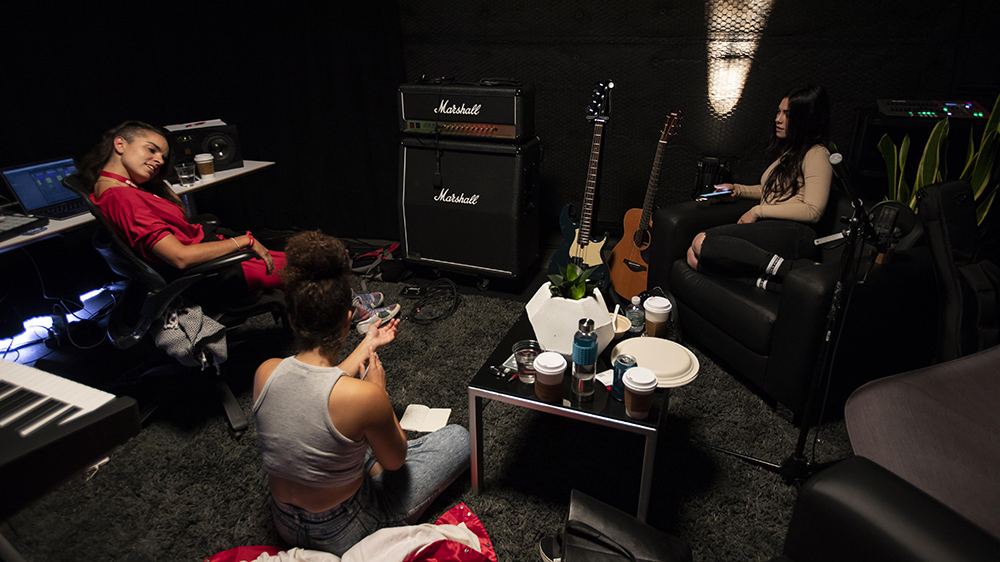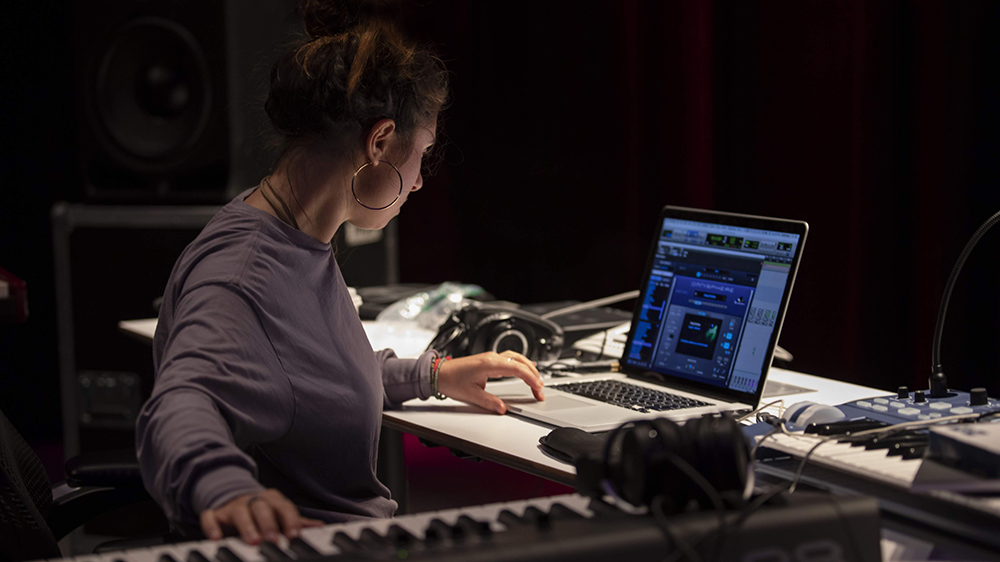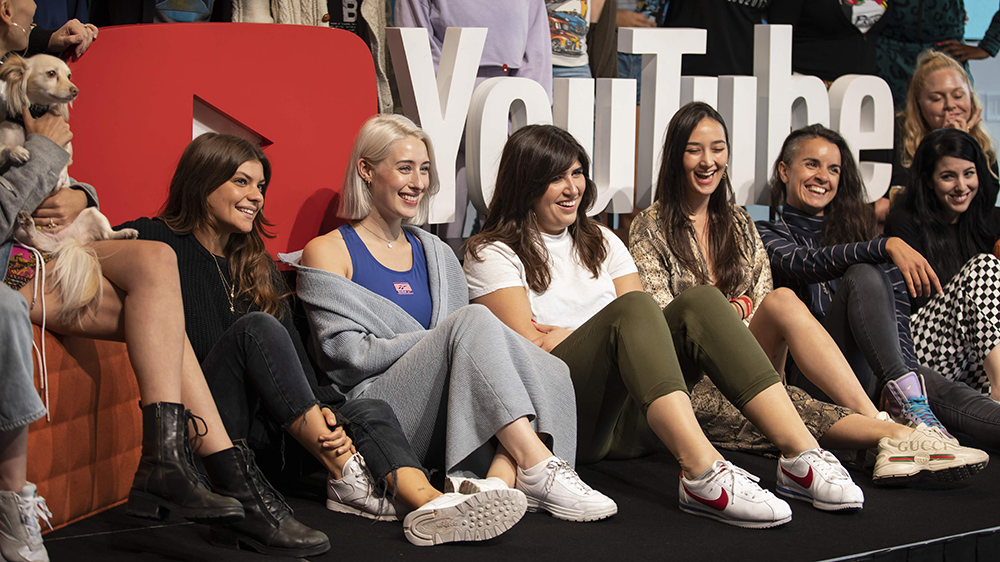YouTube-Sponsored All-Female Writing Camp Is a Musical Revelation
By Shirley Halperin
LOS ANGELES (Variety.com) – “I don’t think a girl would say that.” That opinion was delivered by a male producer to a female singer and songwriter, artist Violet Skies, who was as flabbergasted when she heard it years ago as she is now, sitting in a makeshift lounge at ’s Los Angeles complex of offices and shooting stages. As co-founder of SheWrites, a songwriting camp taking place in L.A. for the first time following stops in London and Stockholm, promoting the idea of women writing for women has become her life’s work and, along with SheWrites partner Charlie McClean (whose production credits include One Direction, Little Mix, Leona Lewis and Ellie Goulding), that mission has touched down with fury.
“I am a vagina-owning person and I’m telling you this is what I would say,” Skies continues, still reeling from her encounter with the unnamed producer. “These camps will change that. It’s a safe space to say stupid things where no one in the room goes, ‘That’s unattractive.’”
“There are plenty of us, we just have to find each other,” adds McClean.
And that’s exactly what these two women, along with YouTube Global Head of Artist Services Vivien Lewit and Lead of Songwriter and Publisher Relations Lindsay Rothschild, set out to do in gathering some two dozens female music makers on Oct. 4 and 5, among them Emily Warren (Dua Lipa’s “New Rules”), Mozella (Miley Cyrus’ “Wrecking Ball”), Olivia O’Brien (gnash’s “i hate u, i love u”) and Lindy Robbins (Demi Lovato’s “Skyscraper”), for an experiment of sorts.
Dividing the massive YouTube stages into mini writing and working rooms, smaller groups of female singers, producers, writers and engineers — collectively representing billions of streams — gathered to see what they could come up with. At the end of the day, the resulting songs would be showcased for all in attendance, which included the artists Lindsey Stirling, “The Four” alum Zhavia and Daya. (Gear, instruments and furniture was donated by YouTube, along with sponsors Steinberg, Kobalt, Adam Audio and Native Instruments.)
“Before the London camp, we didn’t actually know what music made by women sounded like,” says Skies. “Now we know, it’s possible to put a record out with no male hands having touched it. We didn’t know that having consistently worked with men. We surprised ourselves. It’s fighting our own expectations.”
So what’s different ultimately about having an all-female collaboration? “Lots of the girls say they are able to be a bit more honest,” says Skies. “We find a lot of the lyrics more sexual than what you’d expect, but not in the way songs written by men for women are. There, they have an element of control to them — like, this is life through my eyes.”
McClean concurs: “Women are the biggest consumers of music, yet we have music written about women sung by women being written by men. Think about ‘Run the World’ by Beyonce — written by men and Beyonce. There are so many examples of that. It doesn’t mean that guys are bad. They made a great song, but what would it sounds like if a bunch of women had written it? It might speak more honestly to the female experience.”
“What’s interesting about this is it doesn’t seem like that crazy of an idea,” says YouTube’s Rothschild. “But when you actually see everybody in their rooms where they have this producer that’s running the show and it’s a woman, it is different. It’s not a situation that many of these writers have been in before because they’re all so used to working with a male producer or engineer.”
“It’s about the community, too,” adds Lewit. “There is an awareness and an openness and a creative energy that can be different when there are like-minded people together.”
Inclusion is a big word around the YouTube campus. Lewit refers to it both in the context of the USC Annenberg report released in January noting the abysmally low representation of females in the music production and writing fields (female songwriters were represented in 12.3% of the most popular songs; only one in 49 producers of hit songs is female — and translating to 2%, that was a good year) and in adopting the movie industry’s efforts to introduce an “inclusion rider” to sets. “An artist might say, ‘I want at least 75 percent of the people that work on my record to be to be female,’” Lewit offers. “There are different things that you could do to effectuate change here. But it’s about actioning change not just talking about it.”
Later in the afternoon, Skies is tinkering with a lyric that will soon become an earworm. The chorus, “All my life I’ve tried to get into the moment,” needs a line of resolution towards the final refrain. Skies suggests: “But next to you tonight, I’m right here in this moment.” but doesn’t like all the hard T’s so close together. A girl strumming a guitar a chair over throws out: “But under you tonight, I’m right here in the moment.” There’s that liberated sexuality finding its way to the session.
The founders of SheWrites point to three artists who buck the trend: Adele, Taylor Swift and Kate Bush. Of the latter, says Skies: “A lot of high-level [male] producers love Kate Bush. Kate Bush who is self-producing, self-writing and no one could tell her what to do. She expressed herself the way she wanted and, lo and behold, a bunch of men identify with her. … Look at , who speaks to so many people — men and women 00 and she’s been allowed to have her voice from the start. Adele doesn’t conform with anything the music industry has taught women they have to be, so what does that say about the way we treat our female pop stars? Let them do what they think is right and trust their own artistic vision and you’ll see the numbers change.”
“It’s about representation,” says McClean. Adds Lewit: “These initiatives build up a drumbeat that leads to workflows, co-writes and [other] work for female songwriters, producers, engineers and mixers. And it also helps pave the way and empower younger women to be more confident in forging forward on their path to be creative and use their voice.”



